The one thing that parents have in common is that they all parent differently. You may be a free-range mom, while your best friend is a helicopter parent. You may be OK with sodas at dinner, while your neighbor only allows water to pass through her children's lips. There are as many different ways to parent as there are parents on this earth. But, what if what you observe isn't just a difference in parenting style, but a behavior that's potentially harming her children? Would you know what to do when you think your friend is messing up her kids?
It's such a difficult position to be in. Do you confront your friend or do you mind your own business? Getting involved will almost certainly cause tension, and maybe even destroy your friendship. No one likes to feel judged, and most people will act defensive and lash out. You may even be served a helping of your own parental flaws and imperfections. For these reasons alone, you may consider staying out of it.
However, if you have come to believe that the way your friend is behaving is negatively affecting her children, especially if you suspect abuse, there are some steps you can take.
1Don't Jump To Conclusions
Ask yourself, "What is it that my friend is doing that I think is harmful to her children?" "Is she actually being a bad mom, or am I being judgmental about different parenting styles." "Am I only concerned because her beliefs are different than my own?"
In her article "Typology Of A Bad Mother," psychologist Annie Urban wrote that you should, " reserve the term 'bad mother' for those that are truly abusive or neglectful." Another mother allowing or disallowing different behaviors than you do, or raising her family in a different faith system doesn't mean that her children are at risk. Consider Amy Poehler's famous phrase, "good for her! Not for me."
2Be An Example
Your friend may not realize that her behavior, although not necessarily dangerous, is improper in certain situations. In that case, you may want to consider being an example.
Sheree Adams writes in Black and Married With Kids about a time when she realized that one of her friends cursed to, and was excessively impatient with, her own children. Instead of confronting her friend, she decided to work on her own shortcomings and "try to be an example instead of a judgmental female/mom."
3Enforce Rules In Your Home
If your friend's behavior or the behaviors she allows of her children are inappropriate, don't be afraid to set ground rules and enforce them when you are together, especially if she is visiting your home. It's easy for bad behaviors rub off on other children, and while you may not want to judge your friend or her children, you also don't want your children to pick up bad habits or be the only ones reprimanded while the other children continue to run amok. "Let her know that you need to enforce your family rules for all the kids in your home," parenting and youth development expert Deborah Gilboa wrote on her blog Ask Dr. G. "Don’t criticize her child or her parenting, and stay away from the whining."
4Say Something To Your Friend
Sometimes parents don't see how their behavior is perceived from the outside. They may have the best intentions, but their execution is potentially harming their children.
In Alpha Mom, Chris Jordan tells the story of the time she was confronted by another shopper at the grocery store for being "tough" with her misbehaving kids. Although she was angry, she realized she was most upset at herself for acting in a way that she would never tolerate. "I realized that I was angry at this woman for holding up the mirror in which I saw myself."
So many people mind their own business, or judge without understanding all of the facts, but very few people reach out in genuine concern. This may be what your friend needs to readjust her ways.
5Involve Authorities
If you truly suspect that your friend's behavior is physically or emotionally abusive toward her children, you may consider contacting the authorities. “We’re all very aware of child abuse and neglect, but still, most people continue to hang back and say or do nothing when they have concerns," Rayne Golay, mental health counselor and children’s advocate, told She Knows. "This is not acceptable. We all have a duty to keep our children safe.”
Keep in mind that calling the authorities is a serious matter and should be done only in cases where abuse is suspected.
